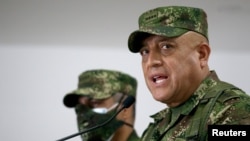The Colombians implicated in the assassination of Haitian President Jovenel Moise had been recruited by four companies and traveled to the Caribbean nation in two groups via the Dominican Republic, the head of Colombia's police said Friday.
Haitian National Police Chief Léon Charles said 17 suspects have been detained in the killing of Moise.
At a news conference in Colombia's capital, Bogota, General Jorge Luis Vargas Valencia said four companies had been involved in the "recruitment, the gathering of these people" implicated in the assassination, although he did not identify the companies because their names were still being verified.
Two of the suspects traveled to Haiti via Panama and the Dominican Republic, Vargas said, while the second group of 11 arrived in Haiti on Sunday from the Dominican Republic.
Vargas pledged Colombia's full cooperation after Haiti said about six of the suspects, including two of the three killed, were retired members of Colombia's army. U.S.-trained Colombian soldiers are heavily recruited by private security firms in global conflict zones because of their experience in fighting leftist rebels and powerful drug cartels.
Recruited to provide 'protection'
The wife of one former Colombian soldier in custody said he had been recruited by a security firm to travel to the Dominican Republic last month.
The woman, who identified herself only as Yuli, told Colombia's W Radio that her husband, Francisco Uribe, had been hired for $2,700 a month by a company named CTU to travel to the Dominican Republic, where he was told he would provide protection to some powerful families. She last spoke to him, she said, at 10 p.m. Wednesday, almost a day after Moise's killing, and he was on guard duty at a house where he and others were staying.
"The next day he wrote me a message that sounded like a farewell," the woman said. "They were running. They had been attacked. ... That was the last contact I had."
The woman said she knew little about her husband's activities and was unaware he had even traveled to Haiti.
Uribe is under investigation for his alleged role in extrajudicial killings by Colombia's army more than a decade ago. Colombian court records show that he and another soldier were accused in 2008 of killing a civilian whom they later tried to present as a criminal slain in combat.
Besides the Colombians, among those detained by police were two Haitian Americans. Some of the suspects were seized in a raid on the Taiwan Embassy, where they are believed to have sought refuge.
Plan allegedly was to arrest, not kill
Investigative Judge Clément Noël told the French-language newspaper Le Nouvelliste that the Haitian Americans arrested, James Solages and Joseph Vincent, had said the attackers originally had planned only to arrest Moise, not kill him. Noël said Solages and Vincent had been acting as translators for the attackers, the newspaper reported Friday.
The attack, which took place at Moise's home before dawn Wednesday, also seriously wounded his wife, who was flown to the U.S. city of Miami, Florida, for treatment.
The U.S. State Department said it was aware of reports that Haitian Americans were in custody but would not comment.
Solages, 35, described himself as a "certified diplomatic agent," an advocate for children and a budding politician on a now-removed website for a charity he started in 2019 in South Florida to assist residents of his hometown of Jacmel, on Haiti's southern coast.
Solages also said he had worked as a bodyguard at the Canadian Embassy in Haiti, and on his Facebook page, which was also taken down after news of his arrest, he showcased photos of armored military vehicles and of himself standing in front of an American flag.
Canada's foreign relations department released a statement that did not refer to Solages by name but said that one of the men detained for his alleged role in the killing had been "briefly employed as a reserve bodyguard" at its embassy by a private contractor.
Calls to the charity and Solages' associates went unanswered. However, a relative in South Florida said Solages did not have any military training, and that he didn't believe Solages was involved in the killing.
"I feel like my son killed my brother because I love my president and I love James Solages," Schubert Dorisme, whose wife is Solages' aunt, told WPLG in Miami.
The Taiwan Embassy in Port-au-Prince said police had arrested 11 individuals trying to break into the compound early Thursday.




